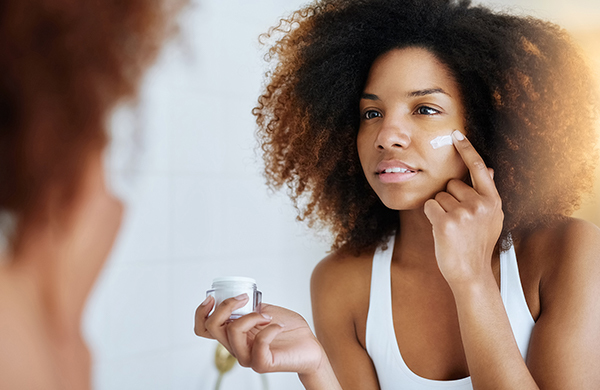
I've been dealing with acne for 18 years, more than half my life. It started back when I was 12 and has never entirely left my face. As a teenager, I naively thought that once I became an adult, I would finally have clear skin. But apart from a few times in my adult life, I've never gone more than a week without new breakouts. And it's all due to my hormonal acne.
What is hormonal acne?
This type of acne, also called adult acne, is caused by hormonal fluctuations and often presents itself along the chin and jawline. According to Dr. Sejal Shah of Smarter Skin Dermatology in New York City, it commonly occurs in adult women ages 20–40, and occasionally after that.
"Unfortunately, hormonal acne can persist well into adulthood. In fact, some women flare around menopause due to hormonal fluctuations," Dr. Shah explains, adding that in her experience, it's harder to treat than teenage acne.
If there is any sort of silver lining to this acid-rain-filled cloud, it's that according to Dr. Shah, "after menopause, women may be less prone to it because sebum production decreases gradually." *sobs*

Hormonal Acne Treatment
Just because this type of acne is extremely stubborn doesn't mean that you have to resign yourself to becoming a whiz at spot concealing. There are numerous ways to treat it, but the challenge is finding a routine that actually works for you.
Over-the-Counter Topicals
If you've been dealing with hormones and acne for as long as I have, you are probably well versed in the world of acne-fighting ingredients. If hormonal breakouts are new to you, however, here are some potential OTC topical treatments that Dr. Shah says can help:
| TREATMENT |
HOW IT WORKS |
EDITOR'S CHOICE PRODUCT |
| Benzoyl peroxide |
Kills acne-causing bacteria |
Clean & Clear Persa-Gel 10 |
| Salicylic acid |
Exfoliates the skin to reduce clogged pores |
Paula's Choice Skin Perfecting 2% BHA Liquid |
| Sulfur |
Kills acne bacteria and exfoliates |
Mario Badescu Drying Lotion |
| OTC Retinoids |
Increases cell turnover, which unclogs pores and prevents them from getting clogged in the future |
RoC Retinol Correxion (something Dr. Shah actually likes for its wrinkle-fighting properties) |
| AHAs (alpha hydroxy acids) |
Exfoliates |
Drunk Elephant T.L.C. Framboos Gylcolic Night Serum |
| Tea-tree oil |
Kills acne bacteria |
Any pure tea-tree oil; just dilute with a carrier oil, such as argan or jojoba |
Common side effects for all of these topical treatments include dryness and irritation.
Prescriptions
If you're one of the lucky ones, your acne will respond to OTC treatments, but it's usually not that simple.
"Because hormonal acne commonly presents with more inflammatory acne, I do recommend seeing a board-certified dermatologist sooner rather than later," Dr. Shah says. "If you are going to pursue OTC treatments, consider seeing your dermatologist if they aren't working after about 6 weeks or so."
Your dermatologist might then prescribe a stronger version of one of the above treatments. Or they might have you try one of these common medications:
| TREATMENT |
HOW IT WORKS |
POTENTIAL SIDE EFFECTS |
| Spironolactone |
Blocks androgen hormones, which can cause acne |
Increased urination (it is a diuretic), irregular periods, breast tenderness, fatigue, lowered blood pressure, dizziness, headaches, thirst, upset stomach, and nausea |
| Isotretinoin (Accutane) |
Increases cell turnover, as well as reduces oil production, P. acnes bacteria, and inflammation |
Dry skin, eyes, and lips; bone or joint pain; vision changes; headache; mood changes; gastrointestinal symptoms; hearing issues; and altered cholesterol and liver-function tests |
| Oral Contraceptive |
Blocks androgen hormones |
Nausea, breast tenderness, headaches, spotting, mood changes |
| Oral Antibiotic |
Kills acne-causing bacteria and reduces inflammation |
Nausea, vomiting, and upset stomach |
Two medications on this list, spironolactone and isotretinoin, seem to come with a scary number of potential side effects. However, Dr. Shah says "they are good medications and generally well tolerated in otherwise healthy people." For example, "with isotretinoin, dryness (skin, eyes, lips) is the most common side effect," she says.
Procedures
Dr. Shah also says that light- and laser-based therapies and chemical peels may help clear up some acne. For instance, blue-light treatments can kill acne bacteria and reduce inflammation. And professional chemical peels deeply exfoliate skin, even more so than at-home peels due to their high percentage of acids.

Dietary Changes
"Diet can play a role in any type of acne. Yes, diet can play a role in any type of acne," Dr. Shah emphasizes. Years ago, doctors would have scoffed at the notion that our diets affect our breakouts. But now, more and more doctors believe that certain foods can trigger hormone fluctuations, leading to the development of acne. Still, Dr. Shah cautions, not everyone'e acne is triggered by diet.
To find out if yours is affected by diet, try cutting out the following things to see if your skin improves:
-
Coffee (*rage sobs*): Coffee may stress out your body's hormones and trigger inflammation, oil production, and eventually, acne.
-
Dairy (*stares desperately into the void, searching for any meaning in this cruel world*): According to the American Academy of Dermatology, studies have found that dairy products may contribute to acne. Skim milk seems to be the main culprit, but whole milk and products made with milk, such as ice cream and cheese, may trigger acne, too.
-
Carbs (*burns everything to the ground*): Unfortunately, there seems to be a stronger correlation between certain delicious carbs and acne. Foods with higher glycemic index (GI) values end up raising blood-sugar levels quickly, and that can mess with hormones. These foods include everything from white potatoes to white bread to chips. The solution is to try to eat more low-GI foods, opting for multigrain bread, vegetables, and beans.
You can also try drinking more spearmint tea to see if that improves your breakouts. According to Dr. Shah, a single study has shown that spearmint tea has anti-androgen effects, meaning that it can lower the levels of androgens (male hormones) present in women. The drug spironolactone works the same way. Spearmint tea also has some anti-inflammatory effects.
But don't get your hopes up too much. "At this time, there is not well-established scientific data specifically evaluating it as an acne treatment," Dr. Shah cautions.
Still, if you like the taste of spearmint and your doctor is cool with you drinking a lot of it, it can't hurt to sip a cup or two a day. Just make sure you get pure spearmint and not a mint medley. I've personally been drinking spearmint tea for a few weeks now, and I think my breakouts are better. That very well could just be a placebo, but I'll take it!

RELATED READS:









